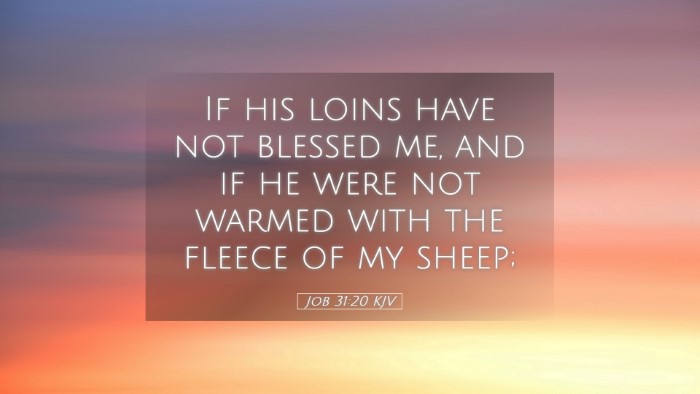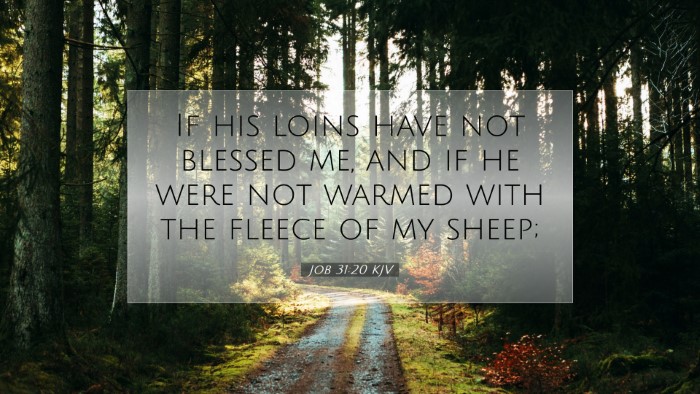Commentary on Job 31:20
Verse Text: "If his loins have not blessed me, and if he were not warmed with the fleece of my sheep."
Introduction
The book of Job is a profound exploration of suffering, righteousness, and theodicy. Job 31:20 occurs in a pivotal chapter where Job defends his integrity and righteousness amidst his friends' accusations. In this singular verse, Job asserts the blessings of his contributions to those in need, illustrating a deep commitment to charity and compassion.
Contextual Background
Job, a wealthy man of the land of Uz, experiences catastrophic loss leading to his profound lamentations. The dialogue structure of the book features Job's exchanges with his friends, who suggest that his sufferings are a direct result of sin. Job's responses consistently point to his innocence. In Chapter 31, Job articulates a final defense of his behavior, calling upon various societal norms to illustrate his righteousness.
Key Themes
- Integrity: Job is adamant about his moral standing before God, symbolized by his acts of kindness toward the less fortunate.
- Compassion: His reflection on the least among him speaks volumes of his character and the societal expectations of generosity.
- Divine Justice: Job’s insistence on his righteousness leads him to question the nature of God’s justice in light of his sufferings.
Insights from Public Domain Commentaries
Matthew Henry's Commentary
Henry emphasizes the notion of social responsibility intertwined with individual integrity. He notes that Job's statement about the warmth his sheep and his charity brought to the needy underpins a broader truth about the body of believers. This reflects the biblical teaching that wealth should not be hoarded but rather utilized to serve others.
Henry writes that Job, in his proclamations, demonstrates true righteousness. The warmth he refers to could be both physical and a metaphorical warmth brought by kindness and connection among the community. This insight is crucial for pastors and church leaders who aim to model Christ-like behavior in their congregations.
Albert Barnes' Notes on the Bible
Barnes focuses on the detailed implications of Job's words. He interprets the line “if his loins have not blessed me” as a reflection on how relationships within a community should be mutually beneficial. Here, Barnes stresses that true charity stems from a recognition of one’s plight as interconnected with others.
This verse also signifies the importance of recognizing the needs of the marginalized. For scholars and theologians, Barnes further invites them to reflect on how contemporary teachings align with the socio-ethical implications Job sets forth—a reminder that faith manifests through acts of love and sharing.
Adam Clarke's Commentary
Clarke delves into the metaphorical language within the text. He notes that "loins" is often associated with procreation and strength; thus, Job’s plea for blessings hints at a longing for generational kindness and prosperity within his household, highlighting the theme of legacy. Clarke’s analysis suggests that Job’s appeal is also for familial and communal welfare through boundless charity.
Furthermore, Clarke points to the theological implications that arise from Job’s despair. He articulates that acknowledging the welfare of others is essential in processing personal suffering. For theologians, the exploration of Job’s integrity gives credence to the concept that one's relationship with God affects how we perceive and interact with the afflicted.
Theological Reflections
At its core, Job 31:20 extends beyond mere physical charity. This verse invites a contemplation on various theological fronts, such as:
- Human Dignity: Job’s acknowledgment of the needy underscores the inherent dignity of all humanity, an essential principle rooted within the framework of biblical justice.
- Suffering and Solidarity: The role of communal solidarity is pivotal; relief in times of distress often rejuvenates communities and fosters hope amidst despair.
- Divine Accountability: Job's plea can be viewed as an assertion that God Himself upholds the ethical norms of generosity and caring in His creation.
Practical Applications
For pastors and leaders, these insights draw attention to practical applications, emphasizing the necessity of active, loving engagement within their ministries.
- Embracing Generosity: Following Job’s example, church leaders are encouraged to cultivate a culture of generosity and service, reminding members of the call to love and sustain one another.
- Cultivating Community Care: Foster opportunities for congregations to engage in service projects, compassion ministries, and crisis assistance that resonate with Job’s principles.
- Teaching Integrity in Faith: Encourage members to maintain their integrity in the face of adversity, drawing parallels between their experiences and Job's unwavering commitment to righteousness.
Conclusion
Job 31:20 serves as a powerful reminder of the reciprocal nature of relationships built upon integrity and compassion. The commentaries by Henry, Barnes, and Clarke deepen our understanding of the text, shedding light on divine expectancies in human interactions. As we engage with this scripture, may it challenge us to reflect on our own contributions to those around us, and to recognize the profound impact of charity in sustaining our communal and divine relationships.


